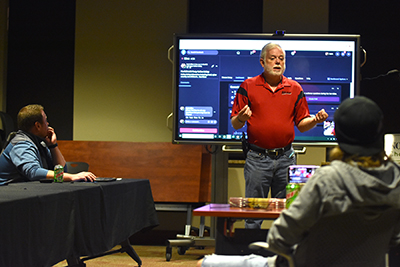NORFOLK, Neb. – As online, shopping, business and other opportunities become more and more prevalent in society, Richard Chrisman reminds consumers there is a simple rule to keep in mind. “Anytime someone is reaching out to you for money unsolicited, you can almost bet it’s a scam of some sort.”
Chrisman, an information technology instructor at Northeast Community College, said phishing attacks, when scammers use email or text messages to trick someone into giving them their personal information, have become common place, especially through regular online consumer platforms. He said people who say they are sellers can get in and out of such sites rather quickly and it is difficult for authorities to track them down.
Speaking during a consumer cybersecurity interactive forum at the Norfolk Area Chamber of Commerce, sponsored by the Norfolk LAN Party, Chrisman said consumers have experienced fraud on a number of regular online platforms where someone takes a big-ticket item, such as a boat, and lists it with a price that is far less than what it would normally be. He said this is when the old adage “if it sounds too good to be true it probably is” should kick in for any consumer.
“The goal isn’t necessarily to get you to buy the boat. The goal is to do a phishing activity to get your information whether it’s your name, your address, your email,” he said. “When hackers or people that are trying to commit a fraud come to you, they’re really looking at getting as much information as possible about you because if they can build a profile, it’s much easier then to assume your identity and get into identity theft.”
Chrisman cautioned that even if someone would buy the product at the lower price or fill out a form for whatever they may purchase, the person at the other end of the transaction will try to get them to either wire or email the money by spoofing an app or website to complete the transaction.
“Not only that, you’re sending your credit details – and that’s the big thing they get. Even if they don’t get the credit details, if they can get the $1,000 or $1,500 a pop, they can sell that same boat many times over.”
If a seller isn’t willing to personally show a big-ticket item that is for sale, that is a red flag. Chrisman cautioned potential buyers to never use their main email account to communicate with a seller, but rather set up a separate another account without using the buyer’s full name for such transactions.
Chrisman suggests that if someone is scammed, they should report it to the proper authorities or to the website or app in question. He said the quicker the perpetrator can be removed from a site, it can possibly save other victims from the same fate of losing their money or having their identity stolen. He is hopeful that one day technology will be able to play more of a role in identifying scammers than what is available today.
Northeast Community College offers a program that trains students in the field of cybersecurity. In 2018, the National Security Agency (NSA) and the Department of Homeland Security selected the College’s Cyber Center as a National Center of Academic Excellence in Cyber Defense Two-Year Education (CAE2Y), one of two community colleges in Nebraska with the designation.
“It’s probably the highest certification or designation that you can get in cybersecurity at the community college level,” Chrisman said.
Northeast’s degree concentration of information technology (IT), information security, and technical services support combine the IT core and general education requirements plus courses from the information security certificate and the technical services support certificate. A student completing the degree will have the skills to provide technical services support within an organization and also have the skills necessary to help the organization ensure continuous operation by safeguarding data from attacks and disasters.
The Norfolk LAN Party event also featured an officer from the Norfolk Police Division and local experienced gamers who spoke on cyber safety. The program may be viewed on the group’s Facebook page at facebook.com/NorfolkLanParty. To learn more about Northeast’s information technology program and its Cyber Center, go to northeast.edu.
--###--
PHOTO CUTLINE
Richard Chrisman, information technology instructor at Northeast Community College (center), speaks on consumer cybersecurity during an interactive forum at the Norfolk Area Chamber of Commerce recently. In addition, an officer from the Norfolk Police Division and local experienced gamers spoke on cyber safety during the event, sponsored by the Norfolk LAN Party.

